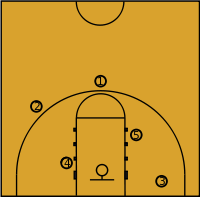| This article needs additional citations for verification. Please help improve this article by adding citations to reliable sources. Unsourced material may be challenged and removed. Find sources: "Shooting guard" – news · newspapers · books · scholar · JSTOR (February 2018) (Learn how and when to remove this message) |
 Michael Jordan is regarded as the greatest shooting guard in the history of the National Basketball Association (NBA).
Michael Jordan is regarded as the greatest shooting guard in the history of the National Basketball Association (NBA). Diana Taurasi (right) is regarded as a top shooting guard in the history of the Women's National Basketball Association (WNBA).
Diana Taurasi (right) is regarded as a top shooting guard in the history of the Women's National Basketball Association (WNBA).
The shooting guard (SG), also known as the two, two guard or off guard, is one of the five traditional positions in a regulation basketball game. A shooting guard's main objective is to score points for their team and steal the ball on defense. Some teams ask their shooting guards to bring up the ball as well; these players are known colloquially as combo guards. A player who can switch between playing shooting guard and small forward is known as a swingman. In the NBA, shooting guards usually range from 6 ft 4 in (1.93 m) to 6 ft 6 in (1.98 m) while in the WNBA, shooting guards tend to be between 5 ft 10 in (1.78 m) and 6 ft 1 in (1.85 m).
Characteristics and styles of play
The Basketball Handbook by Lee Rose describes a shooting guard as a player whose primary role is to score points. As the name suggests, most shooting guards are good long-range shooters, typically averaging 35–40 percent from three-point range. Many shooting guards are also strong and athletic, and have the ability to get inside the paint and drive to the basket.
Typically, shooting guards are taller than point guards. Height at the position varies; many bigger shooting guards also play small forward. Shooting guards should be good ball handlers and be able to pass reasonably well, though passing is not their main priority. Since good shooting guards may attract double-teams, they are frequently the team's back-up ball handlers to the point guard and typically get a fair number of assists.
Shooting guards must be able to score in various ways, especially late in a close game when defenses are tighter. They need to have a good free throw percentage too, to be reliable in close games and to discourage opposing players from fouling. Because of the high level of offensive skills shooting guards need, they are often a team's primary scoring option, and sometimes the offense is built around them.
In the NBA, there are some shooting guards referred to as "3 and D" players. The term 3 and D implies that the player is a good 3 point shooter who can also play effective defense. The 3 and D player has become very important as the game sways to be perimeter oriented.
Good shooting guards can often play point guard to a certain extent. It is usually accepted that point guards should have the ball in their hands at most times in the game, but sometimes the shooting guard has a significant enough influence on the team where they handle the ball extremely often, to the point where the point guard may be reduced to a backup ball handler or a spot-up shooter, a player who "spots-up" for catch-and-shoot shots to provide spacing for the offense. Notable shooting guards include Michael Jordan, Kobe Bryant, Dwyane Wade, Manu Ginobili, James Harden, Klay Thompson, Tracy McGrady, Vince Carter, Clyde Drexler, Jerry West, Sam Jones, Donovan Mitchell, Allen Iverson, and Anthony Edwards in the NBA and Diana Taurasi, Chelsea Gray, Jewell Loyd, Seimone Augustus, Cynthia Cooper, and Cappie Pondexter in the WNBA.
Skills and qualities
It is important for a shooting guard to develop skills in defense, passing and strength in addition to shooting ability. This position displays the most movement offensively when trying to get an open shot, along with keeping things under control on the defensive end.
Understanding that this position is shaped around the shooting ability of the athlete, many external abilities implemented into the player will overall help construct the potential the athlete possesses. External abilities would consist of strong ball handling, a sharp mind, and the development of a high basketball intelligence.
Shooting guards are often used as the secondary ball handler to help eliminate pressure of the 1 guard.
Citations
- ^ Shooting guards are 6'3"–6'7". BBC Sports academy. URL last accessed 2006-09-09.
- Greg Haefner (October 18, 2008). "NBA Analysis: The Rise of the "Hybrid" Player". Bleacher Report. Retrieved May 13, 2020.
- "Basketball Swingman". Rookie Road. Retrieved May 13, 2020.
- "Players and Positions". NBA.com. Oct 8, 2003. Archived from the original on Mar 19, 2018. Retrieved 3 February 2018.
- Joseph, Adi (Nov 26, 2014). "'3-and-D': The specialist's path to a long NBA career". USA Today. Retrieved 3 February 2018.
- Nakano, Nobuyasu; Fukashiro, Senshi; Yoshioka, Shinsuke (2018-07-12). "The effect of increased shooting distance on energy flow in basketball jump shot". Sports Biomechanics. 19 (3): 366–381. doi:10.1080/14763141.2018.1480728. ISSN 1476-3141. PMID 30001184. S2CID 51623814.
References
- The Basketball Handbook (pg 14/15) (2004). Lee H. Rose ISBN 0-7360-4906-1
External links
[REDACTED] Media related to Shooting guards at Wikimedia Commons
| Basketball positions | ||||||
|---|---|---|---|---|---|---|
| Guards |
|  | ||||
| Forwards |
| |||||
| Center |
| |||||